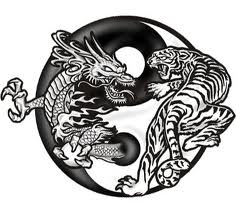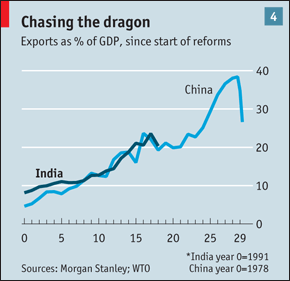Dragons and Tigers and Bears, Oh My!
Competition between China, India - and maybe Russia.
-
Tools:
The Economist recently published two articles which explain their strongly-held belief that the Indian Tiger will pass the Chinese Dragon in the ongoing worldwide economic competition. The lead article said of India, "The country’s state may be weak, but its private companies are strong."
The Economist has long held to the view that American prosperity is due to the tradition that entrepreneurs could exercise their Constitutional right to pursue happiness any way they chose. People who believe in American exceptionalism tend to credit American living standards and power with the economic wealth earned by entrepreneurs who pursue personal gains and drag their entire society to greater wealth along with them. The same thing seems to be happening in India:

India is doing rather well. Its economy is expected to expand by 8.5% this year. It has a long way to go before it is as rich as China—the Chinese economy is four times bigger—but its growth rate could overtake China’s by 2013, if not before (see article). Some economists think India will grow faster than any other large country over the next 25 years. Rapid growth in a country of 1.2 billion people is exciting, to put it mildly.
The Economist points out that due to their one-child policy, China's work force will soon start to age, whereas democratic India refused to go along with Indira Ghandi's attempt to play similar games. There are so few young Chinese relative to the overall population that China will become old before it becomes rich enough to support all the retirees.
The second reason the Economist believes that India will grow faster than China is that India is a democracy. The Chinese government doesn't have to file environmental impact statements or put up with any back-chat from villages whose homes are about to be flooded by a dam or obliterated by a rail line. This top-down structure may make it possible to carry out infrastructure projects efficiently, but it tends to choke off innovation at the bottom.
India, in contrast, is driven by millions of entrepreneurs who operate without government patronage. Many of the biggest Chinese firms are essentially state-owned. This gives them size and credibility but makes it harder for them to innovate. What's worse, the Chinese government's attitude toward the piracy of intellectual property makes it hard for information technology businesses to thrive in China. This is a great advantage for India.
The Economist concludes:
Given the choice between doing business in China or India, most foreign investors would probably pick China. The market is bigger, the government easier to deal with, and if your supply chain for manufactured goods does not pass through China your shareholders will demand to know why. But as the global economy becomes more knowledge-intensive, India’s advantage will grow. That is something to ponder while stuck in the Delhi traffic.
The Chinese economy is larger than India's, but that's largely because the Chinese started permitting private businesses to operate and grow long before India dismantled the "license raj" under which businessmen needed permission to brush their teeth. With the freeing of the entrepreneurial talents in both countries, they're both slated to grow. The Economist expects India to grow faster largely because Indian businesses can operate with less red tape.

Statism Versus Economic Liberty
The coming economic competition between China and India may shed light on the ancient question of whether economies can grow faster with economic freedom or under well-meaning, competent tyrants. Those who argue that America grew primarily because the West offered vast open spaces into which people could expand neglects the fact that the Spanish had similar open spaces and natural resources in South America and failed to produce anything like the American economic engine.
Those who argue for a decisive central government point out that the Indian government, although democratic, is notably corrupt and inefficient. Infrastructure development takes far longer than it should. When businesses are forced to supply their own electricity, water, and bus transportation for employees, achieving growth becomes harder than it ought to be.
We also know that the Soviet command-and-control model resulted in national poverty. Although they tried hard, the bureaucrats simply couldn't manage the Soviet economy efficiently, even though near the end the entire Soviet economy was only about the size of the American health care system.
The Chinese Communist economic policies under Mao Tse Tung also resulted in such poverty that millions starved to death. Although it's obvious that compete government control of the economy leads to poverty, that fact doesn't stop people from arguing that the government needs more control of the economy in the name of fairness, not to mention giving the elites more power to run our lives for us.
The Economist argues that the greater degree of liberty in India will help their economy grow faster:
India’s democracy may confer long-term benefits. It is not just that Indians can say what they please without having tanks rolled over them. It is also that India can change governments without a revolution. In the long run, that may offer a better guarantee of the stability that businesses crave.
It's true that if the next Emperor of China decides to bring back Mao's economics, there would be little that the Chinese could do about it, but India is not as free from repression as the Economist claims. The New York Times reports that people who try to take advantage of India's "freedom of information" law to investigate official corruption risk their lives:
But activists like Mr. Jethwa who have tried to push such disclosures further — making pointed inquiries at the dangerous intersection of high-stakes business and power politics — have paid a heavy price. Perhaps a dozen have been killed since 2005, when the law was enacted, and countless others have been beaten and harassed.
In many of these cases, the information requested involved allegations of corruption and collusion between politicians and big-money business.
Similarly, low-status Chinese who protest government eviction notices tend to have shorter lives than the national average, and our Joe the Plumber lost his job when government officials took offense at his criticism of Barack Obama.
Whither the Russian Bear?
Although Russians became accustomed to having their country considered to be a great power, the Russian population has been dropping for some years. There simply aren't enough Russians to project power internationally even if they could get their economy in order.
The Communist government suppressed businesses for so long that when the regime collapsed, the only groups who were accustomed to finding and taking advantage of economic opportunities were the criminal gangs. These groups rapidly wormed their way into both the government and into the newly privatized businesses. As a result, the Russian government seems to operate more or less like the mafia.
Although this style of government doesn't do very much for the normal cycle of investment and long-term profit-making, Russia has immense natural resources. The extraction of oil from Nigeria, Iraq, and other places where the rule of law is somewhat loose suggests that the Russians will be able to develop their oil industry and make money. Whether they will be able to bring their general population along or whether the wealth will all float to the top as in Nigeria and Saudi Arabia remains to be seen.
For the next two decades or so, Americans will be competing mainly with India and China, with Russia providing a competitive alternative to the Middle East as a source of petroleum and gas.
Other Factors
There are many factors which influence economic growth. China has a much higher literacy rate than India even though Chinese is a lot more difficult to read that most Indian languages. China has a bigger population - their work force is bigger than India's by the size of the American work force. India has more violence between religious groups than China has, although that may change as Chinese Muslims become more numerous.
Despite these side issues, if either China or India breaks out far into the lead over the other, the event will provide suggestive evidence whether tyranny or democracy is better for economic growth.
Regardless of how the economic race works out, however, don't expect too many people to change their minds.
-
Tools:
What does Chinese history have to teach America that Joe Biden doesn't know?


Will,
Let's get one thing straight - barring some apocalyptic catastrophe, China will never be overtaken by India.
The Chinese leadership have ruthlessly pursued their aim to make *China* strong - for many decades. This has been going on long before the idiot/traitor Nixon and his loyal sidekick Kissinger arrived on the scene.
Yes, the Chinese leaders have always been corrupt. So have the Indian leaders. The difference is that most Indian politicians do not try to strengthen their country. The Indian National Congress (as one person put it) might as well have been named the Indian National Calamity. The Leftist parties that came along later were much worse. The BJP had promise but much like the conservative movement here, they never got any good press and never won any big elections (the only time they governed was in a minority coalition government - and that was for a very short time).
To continue, 30% of India's population is now Muslim and a lot of them have - how does one say it - extra-national loyalties. They are a vocal "minority" and the Indian Civil Code doesn't even apply to them. China, on the other hand has a very different approach to their Muslim population.
Lastly, not only is India periodically racked by terrorist attacks from Pakistan (nobly shielded by USA from all reprisal ever since Nixon and his wise adviser Kissinger decided on the "tilt"), but China has created and financed a huge internal problem in the form of the Maoists. WHo are blowing up trains, hijacking buses etc. etc. as we speak.
I will only mention in passing other facts e.g. that most business activities in India are controlled by the politician/mafia axis and the police are just their auxiliary arm, that even the equivalent of a hot-dog stand owner has to pay hefty protection fees to the police/mafia, that intellectual property rights are as weak in India as in China (so no innovation though I doubt we have the capability), that there is no rule of law whatsoever and so on and so forth.
So, no - India is not going to overtake China or even be able to see China's taillights.
What Indians can (and should) do is to take up Mandarin studies to get ready to serve the new masters.
If I sound bitter, it is because I am Indian. To hear Westerners praise India as "strong", "powerhouse", "regional superpower", "threat to China" etc. is akin to a eighty pound weakling with chronic asthma being described as handsome, muscular, unbeatable and probably the next heavyweight champ. It is beyond insulting.
Cheers,
AI